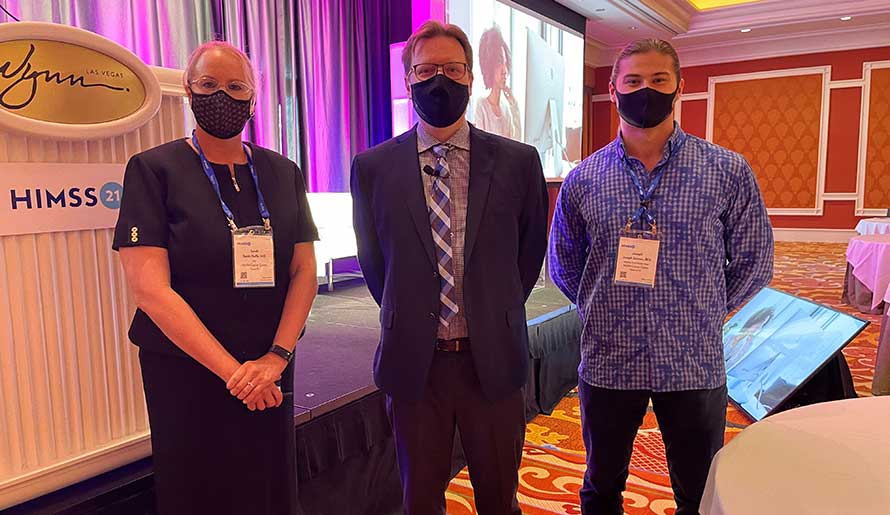
Moffitt and Ringling College of Art & Design Partner Utilizing Virtual Reality to Enhance the Patient Experience
Dr. Sarah Hoffe, Section Head of GI Radiation Oncology, and collaborators from Ringling College of Art & Design (RCAD), Morgan Woolverton MFA, Interim Dept head of Game Art & Virtual Reality, and Joseph Janssen, Virtual Reality senior student, presented at the HIMSS 2021 conference in August.
The presentation “Enhancing the Patient Experience with 360 Video and Virtual Reality Tools” addressed how Virtual Reality (VR) could help alleviate various patient experience issues, such as fear, anxiety and overall satisfaction, which are driving factors that initiated this partnership. The newly developed prototype technology is played in a VR headset so that patients can experience new medical procedures virtually before they do so in real life. During the national HIMSS presentation, Morgan Woolverton emphasized how important it was for this project to have two patient advisors who gave valued input every step of the way. Dr. Hoffe highlighted how the team included not only patients, but multiple staff and faculty members at Moffitt and RCAD, including Moffitt’s Digital Innovation team headed by Senior Vice President/Chief Digital Officer, Dr. Edmondo Robinson, as well as a Moffitt Board of Advisors member/Hollywood futurist and a VR entrepreneur/thought leader, with the development executed by Joseph Janssen.
The goal of this "Dream Team" was to develop a prototype that would reduce anxiety and ease a patient’s nerves prior to treatment. Additionally, the focus was to also help patients prepare for treatments, such as training patients how to hold their breath for treatment with MRI guided radiation therapy (MRgRT). When patients receive MRgRT, they are required to hold their breath for at least 25 seconds at a time which can be difficult for many patients. The VR headset uses gamification to help teach patients how to train their breathing prior to their treatment. Not only could this help improve the patient experience, but it could also help reduce treatment time. Typically, each MRgRT treatment session lasts approximately 1.5 hours per patient. If patients practice their breathing accordingly, this could reduce the time required for each treatment session because there would be fewer pauses and breaks in the treatment itself. Therefore, this could increase the total number of patients that can be treated each day, increasing the availability of the new MRgRT technology to more patients.
Moffitt and Ringling are excited about the opportunities this technology could provide for cancer patients and the talented RCAD VR students. With the growth of digital innovation at Moffitt with the new Center for Digital Health created by Dr. Robinson, this partnership is a great example of when creativity meets science.
The prototype headset technology will soon be entering the feasibility and testing phase. Once testing can be completed, the goal is for it to be deployed in multiple centers. We are excited to see what the future of this innovative Moffitt/Ringling partnership could mean for cancer care.
